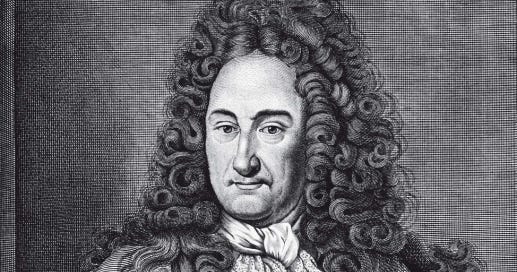Divine Choice and the Best
Leibniz, Classical Theism, and the Problem of Evil - Chapter 3 (part 2)
Greetings, subscribers. As followers of Theological Letters know, I’m feverishly working to finish my forthcoming book on Leibniz and the problem of evil, and I have promised to post fresh installments of my progress every Sunday.
To date, I have posted the Introduction, Chapter 1, Chapter 2, and the first part of Chapter 3. Today, I post the second installment of Chapter 3, Divine Choice and the Best.
If you have yet to read all that comes before, I recommend you do so for context. Links to all prior sections are below. Be watching for the next installment of Chapter 3 next Sunday. Enjoy!
To all my subscribers, thank you for subscribing. To my paid subscribers, thank you for your support. And to any visitors, please consider subscribing and supporting my work. Enjoy!
Chapter 3
Divine Choice and the Best
In David Hume’s Dialogues Concerning Natural Religion, the Scottish skeptic offers perhaps the most famous formulation of the problem of evil in his summary of Epicurus: “Is God willing to prevent evil, but not able? then he is impotent. Is he able, but not willing? then he is malevolent. Is he both able and willing? Whence then is evil?”1 We are not yet to the role of evil in the best, since we will begin with God’s choices concerning goodness, but the Epicurean dilemma is nonetheless instructive. When considering which horn to choose, Christianity has always picked the latter. I do not mean that Christians have ever denied God’s omnipotence — certainly not. But I do mean that Christianity has always held that omnipotence must be qualified. The term does not mean that God can perform whatever notions we might dream up.
Imagine, for example, a square circle. No, I do not mean a square with a circle inside it, or circle with a square inside it, or a square that transforms into a circle. I mean a shape that is simultaneously all square and nothing else and all circle and nothing else. Can you do it? You cannot, and nor can I. For the pairing entails a contradiction. But might God, being omnipotent, make a square circle despite this fact? Many well-meaning folks answer, “Yes,” for they think it would be impious to say, “No.” But does the affirmative reply mean anything? If you say that God can create a square circle, have you said anything at all? You have put together a pair of words, but the pairing is nonsense. And as C. S. Lewis once remarked, “nonsense remains nonsense even when we talk it about God.”2
As mentioned in chapter 1, the position dates back to the early Church. The 4th century Arian dispute, which gave rise to the Council of Nicea (325 AD) and the first draft of the Nicene Creed,3 is replete with claims that the heresies of Arius result in contradictions that not even God can perform.4 And the view remained dominant amongst the medieval Christian realists, who maintained that truths of logic are grounded in God’s own (rational) nature, making them as necessary for God as for us. Hence, as Aquinas explains, “Nothing which implies contradiction falls under the omnipotence of God.”5 The traditional view, then, is that God’s omnipotence is the power to do anything, but formal contradictions are not things. They are semantic gobbledegook.
The importance of the point cannot be understated when dealing with the problem of evil. For both the problem and its solutions hang on the question of what is and is not possible for God.6 But the point is no less relevant when speaking about God’s choices concerning goodness.
Recall that at the close of the previous chapter, we stumbled upon the oddity that despite Leibniz’s insistence that God optimizes being in every way, he rejects with great prejudice the Principle of Plenitude — that is, all that God can produce, he does produce (GD 2). But why? The answer is found in the same qualifications concerning omnipotence used to explain evil: Not every good we might imagine is within the bounds of omnipotence. Of course, this particular application is less appreciated, since folks are far less troubled by the absence of certain goods in our world (say, griffins) than by the presence of certain evils in our world (say, Auschwitz). Yet, this application of the insight — that there are logical boundaries to omnipotence — is central to why Leibniz rejects the strong version of Plenitude. So, with that, let’s consider the boundaries of omnipotence and the complexities of divine choice, not concerning evil, but concerning goodness.
To begin, let’s consider one possible being from within the Chain of Being — say, a human. Can God create such a being? We very casually answer “yes, of course,” evident in the fact that our world is filled with human beings, you and I being two of them. And the answer is correct: There is no logical contradiction in the idea of “human,” which means it is a possible being that is within the bounds of omnipotence. However, there is an underappreciated conditional in the claim: Yes, God can create a human being if he also creates all of the necessary conditions for its existence.
The conditional highlights the way we very casually isolate possibilities without recognizing the vast network of things they require. The mere existence of one man requires a host of other things: terrain (because he is biped), oxygen (because he is aerobic), food (appropriate to his digestive system), water (because he requires hydration), temperature control (appropriate to his body), and so on. And each of these entailments, in turn, have their own requirements. In fact, if we follow the possibility of one man to the possibility of suitable oxygen, food, water, temperature, and so on, and if we follow each of these conditions to their respective requirements — to atmosphere, pressure, photosynthesis, and so on — the chain of entailments from one being to the next quickly grows so complex that we may rightly wonder if the existence of just one man requires the entire cosmos.7
The point is this. Possibles are not isolated affairs. The sort of complex web of entailments described above — where only one man entails a vast network of other things — is what Leibniz calls “concomitance” (e.g., G 6:169-72/H 189-91). Concomitance, in short, is the principle that certain possibilities are inextricably conjoined with other possibilities. So, if the existence of p requires q, then p and q are joined by concomitance. For God to will p, he must also will (or, at least, permit) q. What he cannot do is bring about p without q, since they are conjoined by concomitance.
Since Leibniz has already brought individuals and events into the discussion of the Chain of Being (as seen in the previous chapter), let’s use a more concrete, historical example. Let’s say it is essential to the identity of the prophet Samuel that he is begotten of Elkanah via Hannah — that is, to say, he would not be the Samuel of which we speak without this parentage.8 Samuel, Elkanah, and Hannah are, then, joined by concomitance. God can will the existence of Samuel only if he also wills (or, at least, permits) the existence of Elkanah and Hannah — along with their union. What God cannot will is a world where Samuel exists and Elkanah or Hannah or their union do not.
Incompossibility is the flipside of this coin, referring to the incompatibility of two otherwise possible things. We can invert the above illustration to see the point. Both the existence of Samuel (call this p) and the non-existence of Samuel (call this not-p) are possible, and the same is true of Elkanah (call this q and not-q). We have already said that p and q are conjoined by concomitance. So, while p is possible and not-q is possible, the conjoined proposition of “p and not-q” is impossible — which is to say, p and not-q are incompossible. So, God must choose between them. He can will the existence of Samuel (p), and he can will the non-existence of Elkanah (not-q), but he cannot will both. And lest it go unsaid, we can repeat this process with Elkanah’s father, Jeroham, and Jeroham’s father, Elihu, and so on.9
Paired with our thought experiment about the making of man, we begin to see how the point complicates divine choice. The existence of one man — any man — is conjoined by concomitance to suitable terrain, oxygen, water, food, temperature, and more. And each of these carry their own set of concomitants: Oxygen requires atmosphere and photosynthesis; water requires pressure and heat, and so on. If we could follow the chain of concomitants in all directions, from one entailment to the next, we would likely find that most, if not all, parts of our cosmos require and are required by the other parts, like an interlocking puzzle. And the flipside of this vast codependence is an equally vast web of incompossibility, such that negating one part may well cascade into a negation of the whole.10
The matter only grows more complicated when considering events. We considered the possibility that Samuel is joined by concomitance to not only Elkanah and Hannah but also to his grandfather, Jeroham, and great grandfather, Elihu, and so on. Without even considering the innumerable events within each of these character’s lives — events that led to the conception of the next — we find a chain of unions stretching back to the dawn of creation. When adding the conditions that occasioned each union within the chain, the events again proliferate in ways that offer an entire history, no less interlocking than our cosmic thought experiment.
The bottomline is this. We speak all too casually about what God can do, but in light of such considerations, it may well be that the seemingly simple matter of willing the existence of Samuel entails willing an entire cosmos suitable to him, along with an entire genealogy of which he is part and an entire history to support that genealogy. In short, to will Samuel may be to will the entire world and history to which he belongs.
Such complications are the basis for Leibniz’s distinction between the “antecedent will of God” and the “consequent will of God.” The basic distinction is this. God, being Good, can do none other than will every good, proportionate to its goodness, and shun every evil, proportionate to its lack of goodness. Hence, when naming any good, we can be assured that, considered in itself, God wills it to the degree that it is good. Conversely, if we name any evil, we can rest assured that, considered in itself, God repels it (or wills it not) proportionate to its lack of goodness. Such is the antecedent will of God. But as our thought experiments illustrate, seemingly simple possibilities, such as the existence of one man, are anything but simple. They spider into a vast web of interlocking possibilities, inclusive of some possibilities and exclusive of others. The consequent will of God concerns these complex realities. And the result is that there are a great many goods that God wills antecedently that he must forgo consequently and a great many evils that he repels antecedently but permits consequently because of how they enmesh with other goods.
Such is what it means to speak of the “permissive will” of God. As Leibniz explains,
Here it will be necessary to explain what “permission” is, so that it may be seen how this term is not employed without reason. But before that one must explain the nature of will, which has its own degrees. Taking it in the general sense, one may say that will consists in the inclination to do something in proportion to the good it contains. This will is called antecedent when it is detached, and considers each good separately in the capacity of a good. In this sense it may be said that God tends to all good, as good, … and that by an antecedent will.… Success … belongs only to the consequent will, as it is called…. Now this consequent will … results from the conflict of all the antecedent wills, of those which tend towards good, even as of those which repel evil; and from the concurrence of all these particular wills comes the total will. (G 6:115-6/H 136-7)
To again make the point concrete, let us consider not Samuel but King Josiah, a righteous ruler who “turned not aside to the right hand or to the left.”11 According to biblical testimony, Josiah put an end to the rampant idolatry in Israel; he sought the face of God; he restored the Temple; and he rediscovered the Law of Moses.12 Considered in himself (antecedently), we can easily say that God wills the existence and life of a righteous man, like Josiah. Now, let us contrast this with King Amon of Judah. Amon stands in stark contrast to Josiah, having torn down the altars of God, burned the Torah, established idolatry, and even slept with his own mother as a high-handed affront to God. According to Rabbinic tradition, he was the most wicked of all the kings of Judah.13 We can confidently say that God does not will such wickedness, considered in itself (antecedently).14 Yet, Josiah is the son of Amon. These two kings are conjoined by concomitance. Hence, to refuse the existence of Amon is to refuse (consequently) Josiah. Conversely, to will the righteous rule of Josiah is to permit (consequently) the wickedness of Amon.
This example uses an instance of evil to illustrate the point, so we are getting ahead of ourselves, since our concern here is incompossible goods. So let us instead apply the insight to one such good. Returning again to the prophet Samuel, I presume there is no logical impossibility in the idea that God might have delayed blessing Elkanah or Hannah with a child, and thus, God could have blessed them, not with Samuel, but with a different child (call him “Ehud”), who was conceived at a later time — say, during what would have been Samuel’s gestation. I also see no logical difficulty in the idea that Ehud grows up to be a good and righteous man, one whose existence is favored by God. But our hypothetical Ehud is not compossible with Samuel, since Samuel’s conception excludes the possibility of Ehud’s conception.15 So, though both men are good, and thus God (antecedently) wills that both exist, God must (consequently) choose between them.













